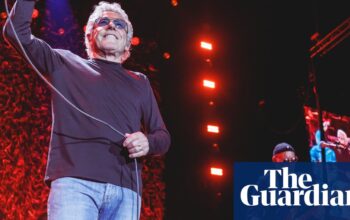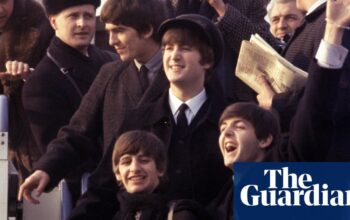It’s hard to believe, but there were summers before Sabrina Carpenter’s Espresso came around. The breezy daytime disco track was only released in April, but already it has contributed one brilliantly stupid neologism (“that’s that me espresso”), spent seven weeks at No 1 in the UK and racked up 1bn streams on Spotify. It has also saturated the world’s coffee shops, bars and taxis so thoroughly that it’s a viable contender to be the song of every summer, à la Get Lucky.
Part of the appeal is that it’s sugary sweet but playfully ominous in tone, Carpenter warning the object of her desire that her charms are so strong he is liable to develop insomnia. She says that when she started writing the song, on a holiday in France last July, “it was a manifestation tactic, because no one liked me romantically at that point – no one was obsessed with me”, she says, letting out a low, deviant chuckle. “I didn’t have anyone I was even talking to. I’ve always been a bit delusional, in that sense.”
What a difference a year makes: Carpenter, 25, has ridden the success of Espresso – the first single from her sixth album, Short’n’Sweet, released today – to become one of 2024’s biggest pop stars, a decade after she released her first single. These days, pop musicians often have to settle for niche fame, as opposed to more traditional markers of success such as sellout arena tours, chart hits or household-name status. But Carpenter has achieved all three.
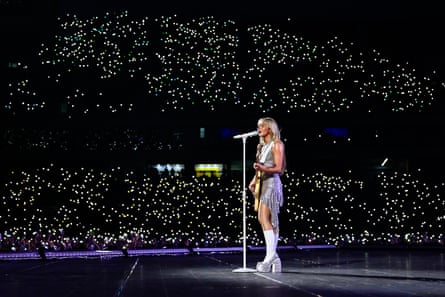
The morning we meet in early June – in the basement of a luxury hotel in Soho, central London; she describes the decor as looking like “they just threw up every pattern in the world” – it has just been announced that Please Please Please, her withering yacht-rock-meets-country follow-up to Espresso, will debut at No 1 on the UK charts, a rarefied new zone for her. Not that she is too bothered. “Full transparency: I’ve never really been on charts until quite recently, so it’s a newfound, like … I’m interested. It’s not the reason I write music and it’s not the reason I’ll ever write music,” she says. “It’s like the sprinkles on top of the sundae.”
Carpenter is part of a wave of year-defining pop stars – including her Island Records labelmate Chappell Roan and the experimental pop doyenne Charli xcx – who feel less manicured and remote than the pop stars who emerged in the previous decade, tailor-made for mass appeal . She doesn’t have the slightly glazed, media-trained expression shared by a lot of other former child stars (she was a Disney kid). Although she arrives at our interview looking like a human Barbie – deeply bronzed, impeccably coiffed, Burberry two-piece freshly pressed – and speaks cautiously and deliberately, she is also quick-witted, liable to slip in a joke at the end of a solemn sentence or let out a hearty, mischievous laugh.
Carpenter’s career has been snowballing for a couple of years. She parlayed a minor scandal (of which more later) into a couple of catchy viral hits, which led to a support slot on Taylor Swift’s Eras tour, where she charmed fans with manicured-but-screwball performances. But Espresso seemed to many listeners to come out of nowhere; Carpenter defines the phrase “overnight success 10 years in the making”.
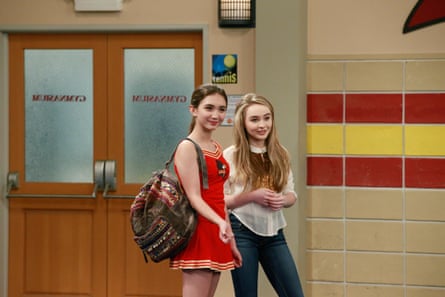
Raised in small-town Pennsylvania, she started working as a child actor when she was 11 and found success with a role in Girl Meets World, a Disney Channel spin-off of the 90s sitcom Boy Meets World, which lasted four years; she also signed a deal with Disney’s Hollywood Records. From a young age, she says, she had a “no plan-B mentality”. She did the hard work required of any aspirant teen star: shows in shopping malls, TV movies, a support tour for the also-ran British boy band the Vamps. One eyebrow-raising photo on Carpenter’s Wikipedia page shows her signing photos for US troops at age 14. The kind of successes Carpenter is experiencing now were on her bucket list back then, but she “didn’t really know what those goals were and what they entailed”.
“You start to realise that there’s more to all of it than just, like, blood, sweat and tears and love and talent and passion. There’s beautiful sides to this and there’s really dark, weird sides to all of it,” she says. “I just love doing it – there’s sort of a need for it – and when that’s the thing that’s driving you, success doesn’t really matter. You’re just gonna keep going regardless. I’ve been called a flop many times and here we are, so …”
Admittedly, Carpenter says, she knew that the likelihood of “people wanting to listen to an album by a 13-year-old girl was not super-high”, so she chose to use the early years of her music career to “make things and not have to be so critical”. A journey into Carpenter’s back catalogue reveals ukulele folk (Can’t Blame a Girl for Trying), drama-kid soul (Shadows) and vaguely Latin-flavoured EDM pop (Looking at Me). Some of it is cringeworthy, but Carpenter was “allowed a lot of experimentation” by her Disney bosses, which has informed her songwriting today. It has an acerbic, funny streak – “I can’t relate to desperation / my give-a-fucks are on vacation”, is one couplet on Espresso – and can be truly strange: Skinny Dipping, a single from 2022, is filled with bizarrely wordy run-on sentences and humdrum depictions of suburban life.
As she hit adulthood, Carpenter says, “people maybe wrote me off, from my past as a Disney kid”, but her fame gradually grew, preparing her for the stardom she is now experiencing, with its attendant scrutiny and hate. “It’s not like you start doing well and everyone loves it and you’re set for life – you reach a certain place you’ve always wanted to be at and then there’s a whole new group of people that want to try to bring you down,” she says. In 2017, for example, she was sued by two former managers for allegedly not paying their commissions: “I was freshly 18. That was like, oop! I don’t even know what to do with that!”
She prevailed in that case – and got a song, Sue Me, out of it – but the general public has been harder to negotiate. “When I was a kid, I just wanted to sing on stage and, in that, I hoped to make people happy,” she says. “And then you realise, especially with the internet: if I’m having a bad day, or didn’t get enough sleep, or haven’t had any coffee, and I say something and the tone comes off a little snarky, there’s a million people waiting to call you a terrible person. You’ve got to tiptoe around the edge of being authentic and protecting yourself, which is a bit of a mindfuck.”
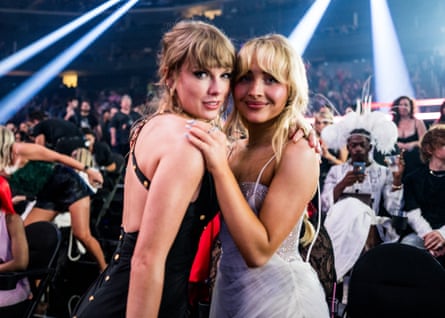
Carpenter is speaking from experience: in 2021, she became persona non grata among some pop fans after she was identified as the “other woman” in Olivia Rodrigo’s breakout single Drivers License. What should have been niche, sophomoric internet drama – a love triangle of Rodrigo, her ex, Joshua Bassett, and his new flame, Carpenter, all three of them former Disney stars – was elevated to mainstream media because of the success of Rodrigo’s song.
As far as scandals go, it was relatively mild – Carpenter’s only crime was dating someone’s ex – but she still faced abuse and harassment. (I am instructed by her minders not to ask her about this period.) She channelled the heartbreak of the end of her relationship with Bassett, as well as the intense scrutiny she faced, into 2022’s Emails I Can’t Send. Technically her fifth album, it was a career reset, with songs that were variously witty, horny and abject in their sadness. It also saw her leave Hollywood Records for Island.
“I definitely felt held back where I was,” she says, adding that she “had to fight a little bit” to get out – although she says she is grateful to her old label boss for “allowing me to leave”.
Rodrigo used the love-triangle scandal to trade Disney for a new image as a heart-on-sleeve balladeer or indignant pop-punker; Carpenter used it to restyle herself as a bawdy, old-school sexpot whose ballads were as sharp as her one-time rival’s. Carpenter knew Emails would allow her a fresh start, so she chose to lead the album with Skinny Dipping – one of the most self-consciously odd tracks she has recorded. “The general public were like: ‘This song is trash!’ But I didn’t want you guys to hear the same thing I’d been doing,” she says. “That song was really pivotal for me – I’m excited and ready to tell stories. And sometimes the only way you can do that is with a weird-ass structure and some run-on sentences.”
Nonsense, the album’s breakout single, is a heady blend of Hawaii slide guitar and rap-adjacent flow about being so aroused that you can’t speak properly – making it a killer karaoke track and a perfect encapsulation of Carpenter’s distinctive style. It wasn’t a big hit, but it did have a moment on TikTok, aided by the fact that every time Carpenter performed the song she would ad-lib a new outro, often using the dirtiest lyrics she could think up; the BBC banned her performance on Radio 1’s Live Lounge after she made a dodgy innuendo on the corporation’s name.
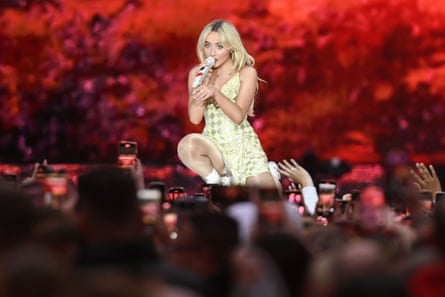
Carpenter was unfazed. “Nonsense happened like a storm in my life, so I didn’t really have time to consider one too many dick jokes.” The outros primed the world for Carpenter’s Espresso moment: amid the filth, they are deeply silly and often use inventive linguistic tricks. “I’ve written literally 900 outros,” she says. “I’ve said a lot of provocative things that I don’t do or feel – I need rhymes, I’m running low!” She suggests something like Yoko Ono’s screamed cover of Katy Perry’s Firework: “I’m gonna start doing that.”
Dick jokes wouldn’t have gone down too well when supporting Swift on the family-friendly Eras tour. Carpenter was unsure “how far to push things: there would be times I did and times [the outros] were super-PG-rated”. But there was no new scandal and their 25 globetrotting dates proved inspirational. “Pop songwriting: I was experiencing that every night. And I was just so mind-blown by the crowds that would sing along to these songs.”
After leaving the tour, she finished making Short’n’Sweet, which is likely to debut at No 1 in the UK and US – Carpenter’s first album chart-topper in either territory. In the vein of Emails, it’s musically varied and relatively breezy in tone, because Carpenter gets “bored of listening to the same song over and over” and loves eclectic records like Sgt Pepper’s Lonely Heart Club Band by the Beatles and Beyoncé’s Lemonade.
Her lyrics remain wordy, a style she says she owes to artists such as Fiona Apple and SZA. “Not that anything sounds like Fiona Apple, but just the cadence of her songwriting, and how it could make you have to really pay attention, really fascinated me,” she says. SZA’s album Ctrl, on the other hand, radically reshaped Carpenter’s approach to song structure, “because it wasn’t the schoolbook ‘verse/pre-chorus/chorus’ that when I was younger I thought I had to make. She just writes what she feels – and that’s a really powerful thing.”
Even more powerful, Carpenter says, is that she is in the driver’s seat. She says “it’s been many years” since she has recorded a song she didn’t co-write and feels she wouldn’t now respond well to outside input. “I’m very lucky that I don’t have people around me telling me what to do – I’m also a Taurus, so if they did, I’d probably get a little stubborn,” she says. Is she a tyrant in the studio? “I’m a tyrant in life.”
Hence a song like Please Please Please, on which she begs a partner not to embarrass her in public – and maybe to just stay at the hotel while she goes out. Upon its release, many speculated the track was written about Carpenter’s then boyfriend, the Saltburn actor Barry Keoghan, whom she later cast in the song’s video. Although I have been warned not to ask questions about her personal life – “Get that last question in, baby!” she teases, when I mention Keoghan at the end of my hour with her – she says that working with him was “one of the best experiences I’ve ever had. I’m very honoured and I got to work with such a great actor!” She screws up her face and mocks her own coy diplomacy in a nasal voice: “Such a great actor!”
This week, they were rumoured to have split. Having to tiptoe around her private life – and accept that parts of it will leak into the public sphere anyway – isn’t Carpenter’s favourite thing, but she has made her peace with it. “It’s not what I signed up for, but I can’t really help when I was born,” she says of life in the social-media era. “I want to be honest – I want to just write about what’s happening in my life as a 25-year-old girl. But it comes with the territory and I just have to be like … OK!”
Source: theguardian.com
